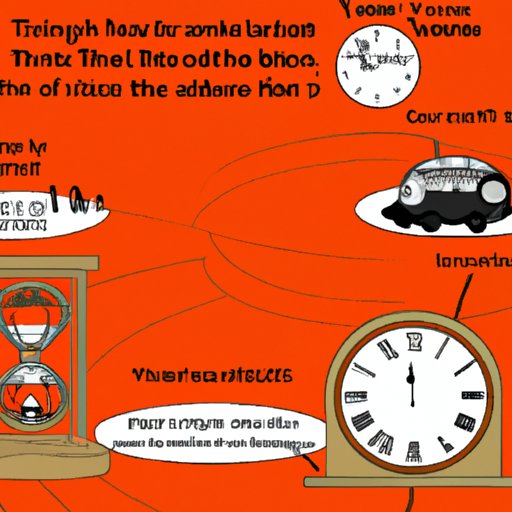Introduction
Time travel is a concept that has long captivated the imaginations of scientists, philosophers, and dreamers alike. The idea of traveling to different points in time – whether forwards or backwards – presents a tantalizing prospect for exploration and discovery. While time travel forwards has been theorized for centuries, the possibility of traveling backwards remains an area of much speculation.
At its most basic, time travel is defined as the movement of a person or object through time from one point to another. This can be accomplished either by moving faster than light (which would require impossible amounts of energy) or by manipulating space-time itself, which is currently thought to be impossible. Despite this, the notion of backward time travel has been explored in science fiction for decades, leading some to wonder if it could actually be possible.
Examining the Physics of Time Travel
When it comes to the physics of time travel, our current understanding is limited. According to Albert Einstein’s Theory of Relativity, time is not a constant but rather something that can be distorted by gravity and other forces. This means that time can move slower or faster depending on a person’s location and speed of travel.
This theory has implications for the possibility of traveling backwards in time. For example, some physicists have proposed the idea of a “closed time-like curve” – a loop in space-time that could theoretically be used to travel back in time. However, this type of loop has yet to be observed or proven, and thus remains in the realm of theoretical physics.
Investigating Potential Consequences
If backward time travel were to become a reality, there are several potential consequences to consider. One of the most obvious is the feasibility of constructing a real-time machine. Such a device would need to be able to manipulate space-time in order to create a closed time-like curve, a feat that is currently beyond our technological capabilities.
Another consequence to consider is the impact of backward time travel on our timeline. If a person were to travel back in time and alter events, the effects could be far-reaching and unpredictable. This raises questions about the ethics of such a practice, as well as the potential for paradoxes and alternate timelines.
Finally, there is the question of what happens when a person travels back in time. Would they exist in two places at once? Could they interact with their past selves? These questions remain unanswered, making it difficult to determine the full implications of backward time travel.

Comparing Scientific Approaches to Time Travel
There are several different scientific approaches to the concept of time travel, each with its own set of assumptions and implications. For example, some scientists believe that time travel is only possible within certain parameters. According to this view, traveling back in time would be constrained by the laws of physics and would require a great deal of energy to achieve.
Other scientists take a more open-ended approach, arguing that time travel is possible without any restrictions. This view holds that time travel could be achieved through the manipulation of space-time, allowing for the possibility of traveling back in time without the need for excessive energy or technology.
The debate between these two approaches continues, with no clear consensus on which is correct. As such, it remains to be seen whether backward time travel is possible and what form it might take.
Conclusion
In conclusion, the possibility of traveling back in time remains an intriguing but largely untested concept. Current scientific understanding suggests that it may be possible, although the exact mechanisms remain unclear. Furthermore, the potential consequences of backward time travel must be carefully considered, as any changes made to the timeline could have far-reaching implications. Finally, different scientific approaches to time travel offer varying perspectives on the feasibility and ethics of such a practice.
Ultimately, further research is needed in order to better understand the physics of time travel and its potential implications. Until then, the concept of backward time travel will remain firmly in the realm of science fiction.
(Note: Is this article not meeting your expectations? Do you have knowledge or insights to share? Unlock new opportunities and expand your reach by joining our authors team. Click Registration to join us and share your expertise with our readers.)
